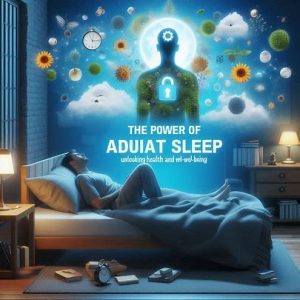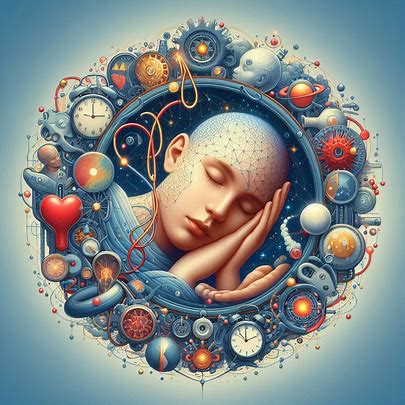Introduction
Sleep is a fundamental pillar of human health, yet it’s often overlooked in our fast-paced, productivity-driven world. Adequate sleep, typically defined as 7-9 hours per night for adults, is not just a time for rest but a critical process that rejuvenates the body and mind. From enhancing cognitive function to supporting physical health, sleep plays a vital role in our overall well-being. In recent years, research has underscored its importance, with new trends in sleep science and technology offering innovative ways to optimize rest. This article explores why adequate sleep matters, its benefits, challenges to achieving it, and practical strategies to improve sleep quality, all while weaving in real-world applications and the latest trends.
Why Adequate Sleep Matters
The Science of Sleep
Sleep is more than just closing your eyes—it’s a complex biological process involving multiple stages, including light sleep, deep sleep, and rapid eye movement (REM) sleep. Each stage serves a unique purpose. For example, deep sleep promotes physical restoration, such as muscle repair and immune system strengthening, while REM sleep supports memory consolidation and emotional processing. According to the National Sleep Foundation, adults need 7-9 hours of sleep per night to cycle through these stages adequately, ensuring optimal health.
Inadequate sleep disrupts this cycle, leading to consequences like impaired focus, weakened immunity, and increased stress. A 2023 study published in Sleep Medicine found that consistently sleeping less than 6 hours per night increases the risk of chronic conditions like heart disease and diabetes by up to 20%. Understanding these stages highlights why quantity and quality of sleep are equally important.
Sleep and Mental Health
Sleep profoundly impacts mental health. During sleep, the brain processes emotions, consolidates memories, and clears toxins through the glymphatic system. For instance, a student cramming for exams might notice improved retention after a full night’s sleep compared to an all-nighter. Lack of sleep, however, can exacerbate anxiety, depression, and mood swings. A 2024 meta-analysis in The Lancet Psychiatry revealed that individuals with insomnia are 2.5 times more likely to experience depressive symptoms.
Real-world example: Sarah, a 30-year-old marketing manager, noticed her anxiety spiking during a high-pressure project. After prioritizing 8 hours of sleep nightly, she reported better focus and emotional resilience, demonstrating sleep’s role in mental clarity.
Benefits of Adequate Sleep
Physical Health Boost
Adequate sleep is a cornerstone of physical health. It regulates hormones like cortisol (stress hormone) and insulin (blood sugar regulator), reducing the risk of obesity and type 2 diabetes. A 2023 study from the American Heart Association showed that individuals sleeping 7-8 hours nightly had a 15% lower risk of cardiovascular events compared to those sleeping less than 6 hours. Sleep also supports muscle recovery, making it essential for athletes or anyone with an active lifestyle.
For example, professional athletes like LeBron James prioritize 8-10 hours of sleep to optimize performance. This trend is now influencing workplace wellness programs, with companies like Google offering nap pods to boost employee productivity.
Cognitive and Productivity Gains
Sleep enhances cognitive functions like problem-solving, creativity, and decision-making. During REM sleep, the brain strengthens neural connections, improving learning and memory. A 2024 study in Nature Communications found that individuals who slept 8 hours before a problem-solving task performed 30% better than those who slept 5 hours.
In the workplace, adequate sleep translates to higher productivity. For instance, a software developer who gets enough rest is more likely to write efficient code without errors. Companies are recognizing this, with some adopting flexible schedules to accommodate employees’ natural sleep patterns, a trend gaining traction in 2025.
Emotional Resilience
Sleep fosters emotional stability by regulating the amygdala, the brain’s emotional center. A well-rested person is better equipped to handle stress and maintain positive relationships. For example, parents who sleep adequately report better patience with their children, improving family dynamics.

Challenges to Achieving Adequate Sleep
Modern Lifestyle Pressures
Today’s 24/7 culture often deprioritizes sleep. Long work hours, social obligations, and screen time disrupt natural sleep cycles. Blue light from smartphones suppresses melatonin, the hormone that signals sleep, making it harder to fall asleep. A 2024 survey by the Sleep Research Society found that 60% of adults report using electronic devices within an hour of bedtime, leading to delayed sleep onset.
Sleep Disorders
Conditions like insomnia, sleep apnea, and restless leg syndrome affect millions. For instance, sleep apnea, which causes breathing interruptions during sleep, impacts 5-10% of adults, according to the American Academy of Sleep Medicine. These disorders reduce sleep quality, leading to daytime fatigue and health risks.
Stress and Anxiety
Chronic stress keeps the brain in a hyper-alert state, making it difficult to relax. For example, a nurse working night shifts might struggle to “wind down” after a stressful day, leading to sleep deprivation. This cycle of stress and poor sleep can become self-perpetuating.
Strategies for Better Sleep
Establish a Sleep Routine
Consistency is key to quality sleep. Going to bed and waking up at the same time daily regulates your circadian rhythm. For example, setting a bedtime of 10 PM and waking at 6 AM creates a predictable pattern that enhances sleep quality. Avoid drastic changes on weekends to maintain this rhythm.
Create a Sleep-Friendly Environment
Your bedroom should be a sleep sanctuary. Keep it dark, quiet, and cool (around 60-67°F, as recommended by sleep experts). Invest in a comfortable mattress and blackout curtains. For instance, John, a teacher, transformed his sleep by using earplugs and a white noise machine to block out neighborhood noise.
Limit Screen Time
Reduce exposure to blue light by avoiding screens 1-2 hours before bed. If that’s not feasible, use blue light filters or glasses. Reading a physical book or practicing relaxation techniques, like deep breathing, can prepare your mind for sleep.
Leverage Sleep Technology
Recent trends in sleep tech offer innovative solutions. Wearable devices like the Fitbit or Oura Ring track sleep stages and provide insights to optimize rest. Smart mattresses, such as those from Eight Sleep, adjust temperature to improve comfort. In 2025, apps like Headspace offer guided sleep meditations, helping users fall asleep faster.

Address Sleep Disorders
If you suspect a sleep disorder, consult a healthcare provider. Treatments like cognitive behavioral therapy for insomnia (CBT-I) or CPAP machines for sleep apnea can be life-changing. For example, a 2024 case study highlighted a patient with sleep apnea who, after using a CPAP machine, reported a 40% improvement in energy levels.
Real-World Applications and Trends
In 2025, sleep is gaining recognition as a public health priority. Schools are adjusting start times to align with teens’ natural sleep cycles, improving academic performance. Corporate wellness programs now include sleep education, with companies like Amazon offering sleep coaching to employees. Public health campaigns, such as the CDC’s “Sleep Well, Be Well,” promote sleep hygiene to reduce chronic disease rates.
On the tech front, AI-driven sleep apps analyze user data to provide personalized recommendations. For instance, the Sleep Cycle app uses AI to suggest optimal bedtimes based on your schedule. These advancements make adequate sleep more achievable for the average person.
Conclusion
Adequate sleep is not a luxury—it’s a necessity for physical health, mental clarity, and emotional resilience. By understanding its importance and addressing barriers like lifestyle pressures or sleep disorders, we can unlock its transformative power. Practical steps, from establishing a routine to embracing sleep technology, empower everyone to prioritize rest. As research and trends evolve, the message is clear: investing in sleep is investing in a healthier, happier life. Whether you’re a student, professional, or parent, committing to 7-9 hours of quality sleep nightly can yield profound benefits. Start tonight—your body and mind will thank you.




